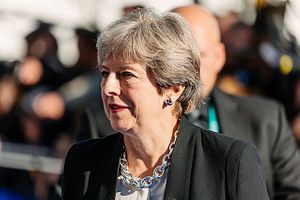British Prime Minister Theresa May, together with worldwide political and business leaders, is currently attending the World Economic Forum in Davos, Switzerland. On the sidelines of the economic forum, May held talks with U.S. President Donald Trump on January 25. Both leaders discussed plans for Trump to pay “a working visit to London in the coming months” and “affirmed [that] the ‘special relationship’ between the two countries is stronger than ever,” the White House said.
On the same day, Chinese foreign ministry announced that May will pay an official visit to China From January 31 to February 2, soon after the Davos forum. Besides Beijing, she will also travel to Shanghai and Wuhan. During her Beijing visit, she will co-host the first bilateral annual prime ministerial meeting with her Chinese counterpart.
Although May attended the G20 Summit meeting held in Hangzhou, China in September 2016, the upcoming trip will be her first official visit to China since she took office in 2016. It will also be the first visit by a British prime minister to China since Chinese President Xi Jinping visited Britain in 2015.
Since Xi’s official visit, China-U.K. relations have entered a “golden era,” according to the Chinese foreign ministry as well as Chinese state media. Last year marked the 45th anniversary of the China-U.K. diplomatic relationship, so both nations launched a series of events to celebrate the anniversary and strengthen ties. Even in security sphere, China has tried to expand military cooperation with Britain; last year, for the first time, China sent warships to Britain’s capital London for a tour.
“China highly values its relations with the U.K.,”Chinese foreign ministry spokesperson Hua Chunying said at the daily press briefing on January 25. “We hope to take this visit as an opportunity to further step up the political mutual trust and… achieve new development of the China-U.K. global comprehensive strategic partnership for the 21st century.”
Notably, Chinese Ambassador to Britain Liu Xiaoming noted that “Brexit offers an opportunity for China-U.K. ties as the British government aims to build a ‘Global Britain’” in a joint interview with Chinese media, according to Xinhua.
“More opportunities, especially in such areas as infrastructure, RMB internationalization, green finance and technological innovation, will emerge as a post-Brexit Britain seeks to build global partnerships while sticking to free trade and an open economy,” Liu continued.
The British government’s current foreign policy appears to be in line with Liu’s analysis.
Since Trump came into office, the U.S.-Britain relations have continued to sour, even though London is still making efforts to maintain traditional ties with Washington. Last year more than a million British people signed an online petition calling for the cancellation of Trump’s state visit to Britain, while Downing Street maintained that the invitation to Trump would not be withdrawn.
Recently this year Trump himself cancelled plans to visit London through his Twitter account by blaming Barack Obama for a “bad embassy deal.” Trump’s decision drew a wave of criticism from Britain again.
Now, May and Trump have agreed that Trump will have a “working visit” to London – which means he won’t be received with red carpets or get to meet Queen Elizabeth II, as Xi Jinping did in 2015.
With London’s ties with the United States under strain and Brexit causing bad blood with the European Union, it’s sensible for the British government to seek wider partnerships with the rest of the world, particularly with China. And China is ready to embrace Britain in return.

































